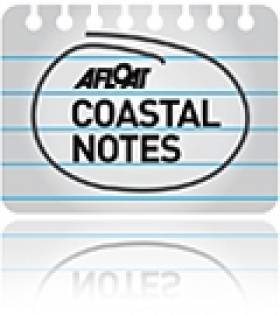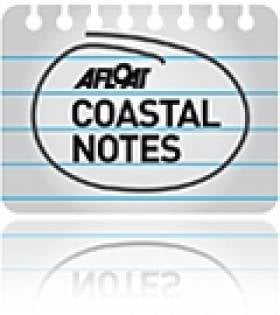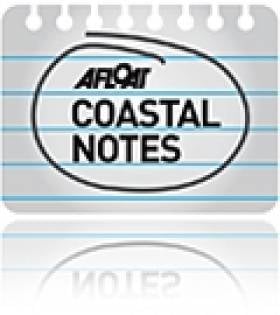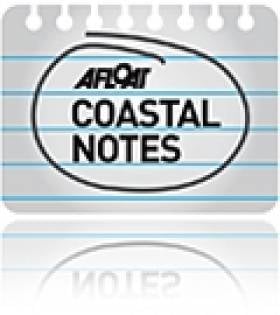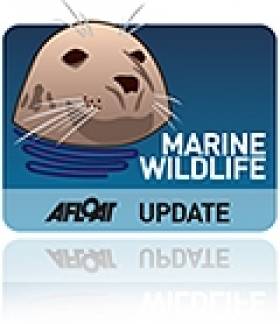Displaying items by tag: Special Protection Area
The seas off Wexford have been designated as a proposed new special protection area (SPA) for birds by Minister of State for Heritage Malcolm Noonan.
The new SPA adjoins eight existing SPAs designated for this area and will cover over 305,000 hectares of marine waters for a range of bird species throughout the year.
The area under the EU Birds Directive surpasses the north-west Irish Sea SPA designated for seabirds last year, Noonan said.
The Wexford designation increases the percentage of Ireland’s protected marine waters to just under the 10% for Natura designations promised by the minister under the EU Biodiversity Strategy.
 Gannetts on the Saltee Islands Photo: Vincent Bradley
Gannetts on the Saltee Islands Photo: Vincent Bradley
It also makes that 10% milestone “realistically achievable within the current year”, he says.
“At 305,000 hectares, the seas off Wexford SPA is bigger than Co Wexford itself and the largest ever area to be protected for birds in the history of the State,” Noonan said.
“ I’m delighted to be able to announce this significant step forward for nature, and particularly for marine seabirds. This Government is working hard to ensure robust biodiversity protections, just as we are working hard to deliver on our offshore renewable energy objectives,” he said.
“ Biodiversity action and climate action must go hand in hand, and we must continue to work together to protect nature while delivering a swift transition to more sustainable and renewable forms of energy,” he said.
National Parks and Wildlife Service director general Niall Ó Donnchú said the designation represented “another determined step by Ireland to protect our marine birdlife”.
“The 20 species protected at this site are some of our rarest and most threatened birds, and these waters are a valuable feeding resource for the seabirds that return every spring to Wexford’s coastal and island colonies to breed,” he said.
“ Outside of the summer months, these relatively shallow coastal waters provide safe feeding and roosting opportunities for a range of marine birds overwintering here or on passage,” he said.
The marine waters off the coast of Co Wexford mark the boundary between the Irish and Celtic Seas, and the new SPA extends offshore along most of the county’s coast.
More detailed information about the site, including a map, a species list and a list of the activities requiring consent (ARCs) for the site, is available at www.npws.ie/protectedsites.
Objections or observations, which may only be based on scientific or ornithological grounds, can be submitted to the email address [email protected].
Bird species covered by the proposed SPA designation are: the Common Scoter, Red-throated Diver, Fulmar, Manx Shearwater, Gannet, Shag, Cormorant, Kittiwake, Black-headed Gull, Lesser Black-backed Gull, Herring Gull, Little Tern, Roseate Tern, Common Tern, Arctic Tern, Sandwich Tern, Mediterranean Gull, Puffin, Razorbill and Guillemot.
 Razorbills on the Saltee Islands Wexford Photo: Vincent Bradley
Razorbills on the Saltee Islands Wexford Photo: Vincent Bradley
Four of the existing SPAs in this area are designated for breeding seabirds, namely Lady’s Island Lake SPA, Wexford Harbour and Slobs SPA, Keeragh Islands SPA and Saltee Islands SPA.
The Fair Seas coalition of environmental organisations said the proposed SPA should be a cause for celebration, but said that” a lack of proper community engagement, no coinciding management plans and no sign of the promised Marine Protected Area (MPA) bill is risking public trust in the process”.
Fair Seas said that “although the news is welcome, proper consultation with local fishers, industry, communities and other stakeholders is vital to ensure its success”.
The group is campaigning for “strong and ambitious MPA legislation to be introduced as a matter of priority”.
Consultants to Carry Out Survey of Coliemore Harbour
#COLIEMORE HARBOUR FERRY – Asides the controversial issue of the granting for an exploratory oil well drill license off Dalkey, local residents group have also stepped up a campaign since the summer to restore the island ferry which has not been operating in recent years, reports Jehan Ashmore.
As previously reported on Afloat.ie, Dun Laoghaire-Rathdown County Council's recent unveiling of a consultant's report of the proposed PART 8 Scheme to upgrade Dalkey Island harbour, also sees the same consultants appointed to carry out a separate survey of Coliemore Harbour, the traditional mainland embarkation point of the ferry run by generations of local families.
The consultants Malachy Walsh & Partners are to carry out a structural survey on the condition of the small stone cut harbour completed in 1868, which aswell as a tourist attraction is an amenity throughout the summer for anglers, divers and kayakers alike.
DLRCC which owns the harbour, have deemed the piers unsafe and claim concerns over public safety issues for those accessing the harbour when commercial boats were in operation. It is expected that DLRCC are to receive the conclusions of the report though not until February or March, this is to enable the consultants to monitor winter weather impacts on the harbour.
The council have claimed that repair costs could be prohibitive, possibly running into millions and it is understood that such expenditure were not factored into council's Capital Programme 2012-2016. As previously alluded, the PART 8 scheme exclusively deals with Dalkey Island alone where there also plans to restore the Martello Tower and Gun Battery, though not St. Begnet's Church which is the responsibility of the OPW.
The ferry restoration group, has also called for the short five-minute ferry ride to the 22-acre island be reinstated by a licensed operator. The licensing is under the remit of the Marine Survey Office at the Department of Transport and a future ferry service would require an open tendering process.
It has been feared by locals that the demise of a boat service arising from Coliemore's closure to ferry services, could lead to a temporary or longer term service running from Dun Laoghaire.
As previously reported on Afloat.ie a new cruiseliner tender dock facility was installed earlier this year as part of the Dun Laoghaire Harbour Company masterplan, where the facility would also be used for boat tours of Dublin Bay and to Dalkey Island.
It has been suggested that should such a service run, that a RIB based craft would be likely used on the longer exposed crossing to the island and taking up to 25 minutes. The consequences of an enhanced ferry operation and its potential impacts on the island were discussed as part of last month's inaugural Dalkey Island Forum.
Dolphin Group Comments on Dalkey Island Prospect
#DALKEY ISLAND PROSPECT - The Irish Whale and Dolphin Group (IWDG) has joined the chorus of opposition to the proposed oil and gas exploration off Dalkey Island in Co Dublin.
As previously reported on Afloat.ie, Providence Resources has applied for a foreshore licence to search for oil or gas about 6km out to sea on the Kish Bank Basin.
But the prospect has provoked a split in the local community over the potential risks and benefits, with many calling for a public enquiry into the licence before it is granted.
This evening an urgent meeting in Dun Laoghaire will address the public's concerns, which have been echoed by the IWDG.
"The Kish Bank and adjacent waters are important for cetaceans," said the group in a statement. "In addition, sightings of bottlenose dolphins have increased dramatically in the area following the presence of a group of three individuals since August 2010."
The IWDG is concerned about the potential effects on dolphins and porpoises that "could due to noise generated from the drilling process", noting that "there is little published data on the intensity and effects of sound generated by drilling".
Protest group Protect Our Coast has launched a online petition against the Dalkey Island Prospect citing concerns over the proximity of the drilling area to the mainland as well as the Special Protection Area of Dalkey Island, which is a haven for marine wildlife.
- Irish Whale and Dolphin Group
- IWDG
- Dalkey Island Prospect
- Coastal Notes
- Dalkey Island
- Dublin
- oil and gas
- exploration
- drilling
- Providence Resources
- foreshore licence
- Kish Bank Basin
- community
- Dun Laoghaire
- bottlenose dolphins
- Porpoises
- Cetaceans
- noise
- sound
- Protect Our Coast
- protest
- petition
- Special Protection Area
- marine wildlife
Dalkey Meeting to Discuss Proposed Oil Drilling
#'DALKEY ISLAND' PROSPECT – In response to a proposed exploratory search for oil and gas operation by Providence Resources off Dalkey Island, Co. Dublin, as previously reported on Afloat.ie, a public meeting is to be held by Dalkey Community Council next week, writes Jehan Ashmore.
The meeting to be held next Tuesday in Dalkey Town Hall (at 7.30 p.m.) is to discuss the Providence venture, named 'Dalkey Island' prospect, in reference to the island off the south-side suburb. The island and the coast along Dalkey is geographically the nearest landfall to where the proposed 'jack-up' drill rig would operate in block (33/21) in the Kish Bank Basin.
An online petition (see www.protectourcoast.net) by campaigners, entitled 'Protect Dublin Bay, Dalkey Island and Killiney Bay from Large Oil Drill 2012', has already gained large support, including signatures from overseas. They are in protest over Providence Resources application for a foreshore license which has been lodged with the Department of Environment.
Providence Resources propose to drill a single borehole for the exploratory well which is likely to be in an area only 6kms offshore of the Dalkey coastline. The island is designated a Special Protection Area (SPA) and notably where there have been sightings of bottlenose dolphins in neighbouring Killiney Bay.
Should the oil be commercially viable, the benefits of becoming self-sufficient and security of supply would be of significant economic benefit to Ireland. To date 100% of the country's oil and 95% of its gas is currently imported, and yet most of Ireland's natural resources are unexplored, according to Providence Resources.
Exploration is an expensive exercise and has no guarantee of discovery while the timeframe from discovery to production can typically take five to seven years.
"Yet," say Providence Resources, "the implications of discovering and utilising such a natural resource, and potentially becoming self-sufficient in energy terms, would be of significant economic benefit for Ireland Inc. in terms of taxation, employment, security of supply and skills development."
To read more information about Dalkey Island Prospect from Providence Resources, with maps, montages (including views from White Rock Beach) newsletters and video presentation visit www.providenceresources.com/dalkeyisland.aspx
- Dublin Bay
- bottlenose dolphins
- dalkey
- Dalkey Island
- Providence Resources
- Kish Bank Basin
- Coastal Notes
- Killiney Bay
- Special Protection Area
- Dalkey Community Council
- Foreshore License
- SPA
- 'Dalkey Island' prospect
- Coastal note news
- Department of Environment
- ProtectOurCoast
- Protect Dublin Bay,Dalkey Island and Killiney Bay from Large Oil Dril 2012
Campaign to Stop Planned Oil Drill off Dalkey Island
#DALKEY ISLAND PROSPECT - An online petition organised by Protect Our Coast in protest over plans by Providence Resources to start exploratory drilling for oil and gas off Dalkey Island, in south Co. Dublin, has reached over 2,000 signatures to date, including support from overseas.
Providence Resources are seeking permission from the Department of Environment for a foreshore licence to carry out site investigation and drill testing in waters depths of 20-30m in the Kish Bank Basin, at the Dalkey Island 'Prospect'.
They propose drilling one exploratory well some 6kms offshore, though the exact location chosen for the well site is subject to results of seismic surveys. This particularly area lies closer to the coastline, as it is on the more westerly fringes of the exploratory block (33-21) zone.
The campaigners object to the proximity of the well site off Dalkey Island which is designated a Special Protection Area (SPA). The island is home to a resident herd of goats, is rich in birdlife, seals and cetaceans, notably bottlenose dolphins in neighbouring Killiney Bay, which have drawn recent media attention and aided the objectives of the campaign, see www.protectourcoast.net
In addition they oppose the drilling location given its closeness to a large urban population and the risk of an oil-spill and consequent effects to humans and the environment throughout Dublin Bay.
If granted, exploratory work is due to start this year, with Providence claiming the entire process would take up to six months, between survey and drilling operations. During part of that timeframe, up to two seismic vessels will be employed, prior to deploying a 'jack-up' rig to the well site.
Should the oil be commercially viable, the benefits of becoming self-sufficient and security of supply would be of significant economic benefit to Ireland. To date 100% of the country's oil and 95% of its gas is currently imported, and yet most of Ireland's natural resources are unexplored, according to Providence Resources.
Exploration is an expensive exercise and has no guarantee of discovery while the timeframe from discovery to production can typically take five to seven years.
"Yet," say Providence Resources, "the implications of discovering and utilising such a natural resource, and potentially becoming self-sufficient in energy terms, would be of significant economic benefit for Ireland Inc. in terms of taxation, employment, security of supply and skills development."
To read more information about Dalkey Island Prospect from Providence Resources, with maps, montages (including views from White Rock Beach) newsletters and video presentation visit www.providenceresources.com/dalkeyisland.aspx
As previously reported on Afloat.ie, the application for the foreshore license is currently on view in Dalkey and Dun Laoghaire Garda stations. The application contains maps, plans, and drawings which can be inspected, noting the public consultation process ends on Thursday 2nd February 2012.
In addition for information from the Department of Environment's website, click HERE. Those wishing to make an objection or representation of the sought license should make submissions to the Foreshore Unit of the department on close of business (also) on Thursday 2nd February 2012.
.
- Dalkey Island Prospect
- Dublin Bay News
- Providence Resources
- Protect Our Coast
- Dublin Bay Oil drilling
- Killiney Bay
- Dalkey Island
- Dalkey Island Goats
- Dalkey Dolphins
- Department of the Environment
- Foreshore License
- White Rock Beach
- Killiney Beach
- Kish Bank Basin
- Special Protection Area
- SPA
- JackUp rig
- seismic survey
- Irish economy
- Online petition
- Well Site
- Exploratory Well Kish Bank Basin
- Cetaceans
- bottlenose dolphins
Warning Over Oil Drill Threat to Rathlin Island Wildlife
Wildlife on Rathlin Island could be under threat if oil-drilling licences are awarded in the area, the Belfast Telegraph reports.
The north Antrim coast has been earmarked as a site for potential oil exploration in the latest round of British Government licensing, despite the area being designated as both a Special Protection Area and a Special Area of Conservation.
Environmental experts have warned of the devastating effect that oil drilling could have on marine wildlife on Rathlin Island and the nearby coastline.
"We've seen off the coast of Aberdeenshire that no matter how careful the drilling, there is always the risk of a spill," said Claire Ferry of the RSPB.
"In this case the spill happened far away from any vulnerable wildlife colonies, but just imagine the impact if that oil was washing onto a globally important seabird colony."
The Belfast Telegraph has more on the story HERE.



























